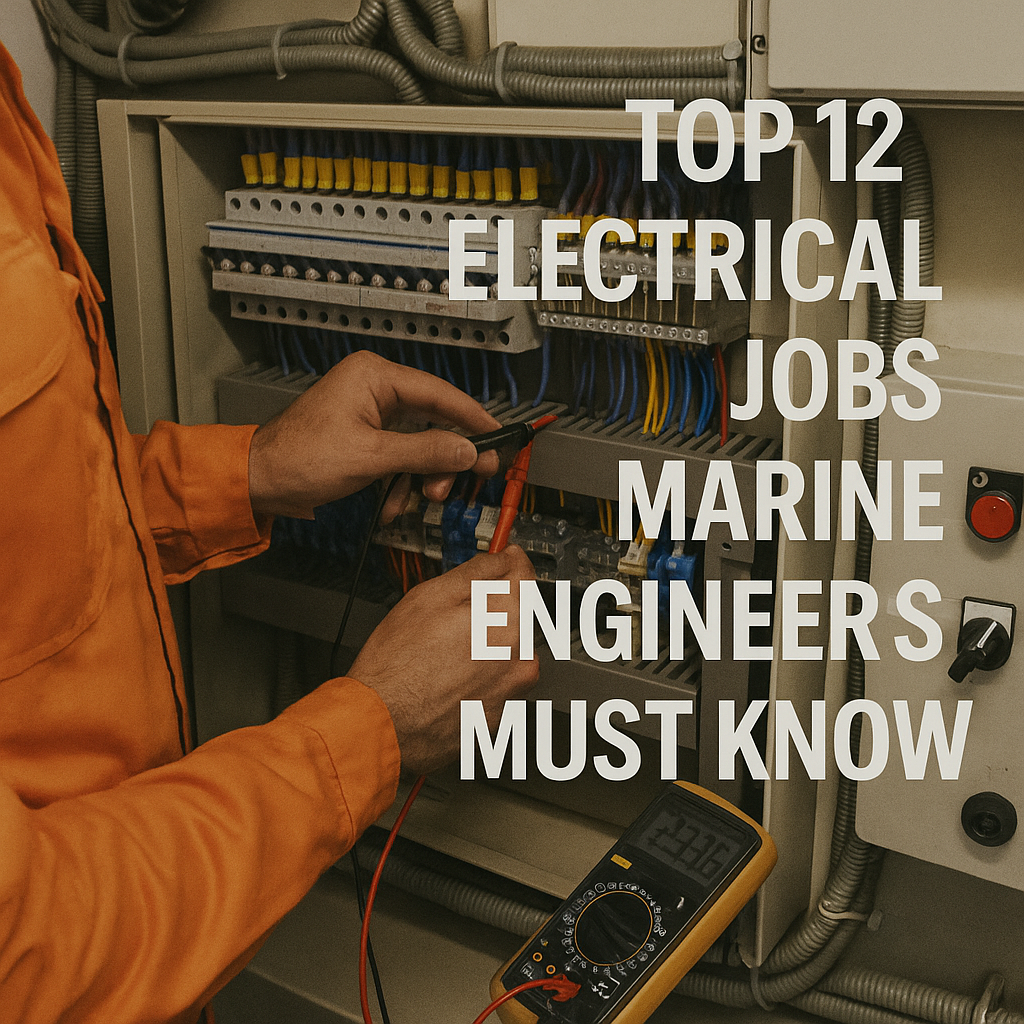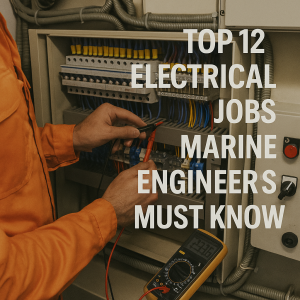Discover 12 essential electrical jobs every marine engineer should master to keep modern ships running safely and efficiently. Learn practical skills, challenges, and insights in this detailed guide.
Power at Sea Is More Than Just Switches
Imagine standing in the engine room of a massive ship rolling through a heavy sea. You hear the hum of the main generator, see the glow of a control panel, and sense how vital every bit of power is. On modern ships, electricity is more than a convenience — it is the lifeblood of propulsion, navigation, and even the crew’s comfort. That’s why marine engineers must be more than just mechanical troubleshooters. They must be skilled electrical operators, ready to handle everything from faulty breakers to complex automated systems. If they get it wrong, the costs can be enormous — downtime, cargo damage, even threats to life.
In this article, you’ll discover 12 core electrical jobs every marine engineer should know. We’ll break them down with real-world stories, best practices, and industry references so you can sharpen your knowledge whether you’re a maritime student, cadet, chief engineer, or a passionate enthusiast.
Why Electrical Competence Matters in Modern Marine Operations
Ships today are floating microgrids. Unlike in the past, where diesel mechanical systems ruled, modern vessels rely on intricate electrical networks to run everything from fuel pumps to radars to fire suppression systems.
The International Maritime Organization (IMO) has published data showing a 22% increase in shipboard electrical complexity since 2010 (IMO, 2023). With decarbonisation pushing hybrid and electric propulsion forward, marine engineers must keep pace with these changes to maintain safe and efficient operations.
The shift is so significant that many maritime academies — for instance, the Massachusetts Maritime Academy — have expanded their electrical and electronics curriculum by 40% since 2019.
Key Developments Driving Change
Several trends are shaping why electrical competence is mission-critical:
- Growth in hybrid-electric propulsion
- Increased shipboard automation and computerised controls
- Regulatory demands for energy efficiency and emission cuts
- Rising cybersecurity threats to critical ship systems
According to Lloyd’s Register (2023), over 55% of newly built vessels now have advanced power management systems requiring highly trained engineers to install, operate, and troubleshoot.
In-Depth Analysis: 12 Electrical Jobs Marine Engineers Must Know Onboard
Let’s dive in.
1. Generator Synchronisation and Load Sharing
Marine engineers must know how to safely bring multiple generators online to share power loads without risking blackouts. The principle is simple, but mistakes can cause major damage.
For instance, in 2022, a ro-ro ferry suffered a total blackout because its two generators were not properly synchronised, leading to power loss during port departure (source: Marine Accident Investigation Branch).
Understanding phase sequence, load balancing, and breaker timing is critical — skills no engineer should leave maritime school without.
2. Maintenance of Main Switchboards
A ship’s main switchboard is its power heart. From circuit breakers to busbars to relays, engineers must maintain this equipment to prevent fire hazards or catastrophic arcing faults.
Best practice includes IR (insulation resistance) testing, thermal scanning to spot hotspots, and keeping tight records of breaker performance.
The Marine Engineering Practice Series by IMarEST outlines practical switchboard checklists for junior and senior engineers.
3. Emergency Power Systems
When the main power fails, emergency generators and batteries keep critical systems alive — including navigation, steering, fire pumps, and alarms.
Marine engineers must know how to test, maintain, and start these emergency power systems reliably. According to Paris MoU port state control data, nearly 15% of detentions in 2022 involved problems with emergency power.
4. Electric Motor Overhauls
From fuel pumps to steering gear, shipboard motors are everywhere. A marine engineer should be comfortable dismantling, inspecting, rewinding, and aligning electric motors.
One chief engineer shared on The Maritime Executive that a $10 motor bearing failure once halted an entire reefer compressor, risking spoilage of $1.5 million in frozen tuna.
No one should underestimate small motor failures — they can sink big profits.
5. Testing Fire Detection and Alarm Systems
Fire on board is every seafarer’s nightmare. Modern ships rely on heat, smoke, and flame detectors wired into advanced control panels.
Engineers must test these systems weekly, per SOLAS Chapter II-2, and verify all circuits are live.
A missing alarm can mean lives lost, so this electrical job is not a box-ticking exercise — it’s life safety.
6. Cable Inspections and Megger Testing
Harsh marine environments break down insulation over time. Seawater, vibration, and oil can all degrade cables.
Marine engineers must regularly perform megger tests (insulation resistance) to catch breakdowns early. Also, physically inspecting cable trays, glands, and routing for chafing or moisture is part of a thorough routine.
The International Electrotechnical Commission (IEC 60092) standards provide an excellent reference for this.
7. Battery Maintenance
Batteries on ships are critical, whether for emergency lights, starting diesel engines, or backup power for computers.
Engineers should understand correct charging cycles, acid level checks (for wet cells), ventilation to avoid hydrogen build-up, and temperature monitoring.
In recent years, lithium-ion marine batteries have grown more common, demanding additional care and fire precautions (source: DNV, 2023).
8. Navigational Light Circuit Checks
The IMO’s COLREGs require all navigational lights to work reliably at sea. Failing nav lights can lead to fines or worse, collisions.
Marine engineers must inspect navigation light panels, replace faulty bulbs or LEDs, check fuses, and verify that control switches operate properly.
Simple, yes — but absolutely mission-critical.
9. Control Circuit Troubleshooting
Modern ships use PLCs (programmable logic controllers) to manage things like ballast systems or cargo pumps. If a relay or sensor fails, engineers must trace the issue logically, diagnose voltage or signal faults, and reset or replace faulty components.
Courses from the Royal Institution of Naval Architects (RINA) increasingly stress control system literacy for junior officers because of these shipboard demands.
10. High-Voltage Safety
Many vessels now operate medium-voltage or even high-voltage systems for propulsion or bow thrusters.
Marine engineers must know arc-flash hazards, personal protective equipment (PPE) requirements, safe isolation, and lock-out/tag-out procedures.
This is not theoretical — there are real fatalities every year from high-voltage mishandling, even among experienced engineers.
11. Ballast Water Treatment Electrical Systems
Modern ballast water treatment plants use UV lights, electrochlorination, and automated monitoring. Engineers must maintain the sensors, power supplies, and control panels of these systems, which are essential for compliance with the Ballast Water Management Convention.
One study in the Marine Pollution Bulletin found that 34% of treatment systems inspected in 2021 had electrical faults needing repairs — a clear reminder of why engineers cannot ignore them.
12. HVAC and Accommodation Electrical Circuits
Crew welfare depends on reliable air conditioning, lighting, and galley equipment.
Marine engineers must monitor supply voltages, inspect contactors, and ensure ventilation fans work properly. Comfort may seem secondary to propulsion, but remember — poor crew welfare causes fatigue, and fatigue causes accidents.
As Maritime Labour Convention surveys show, healthy and rested crews are directly linked to safe operations.
Case Studies and Real-World Applications
Consider the 2018 engine-room fire on an LPG tanker off Gibraltar. Investigators found a loose cable connection in the main switchboard started a fire after arcing. Had the engineer performed a routine thermal scan, the hotspot might have been spotted.
In another case, a large cruise ship lost propulsion when a generator synchronisation sequence failed because of incorrect breaker timing — leaving 4,000 passengers drifting for hours.
These stories show why these 12 electrical tasks are not optional “extra skills” — they are vital for safety, efficiency, and compliance.
Challenges and Solutions
Marine engineers face challenges including:
- Older ships with outdated wiring
- Harsh marine corrosion
- Human error under time pressure
- The rise of sophisticated, digitalised systems
Solutions include:
- Consistent training and revalidation (for instance through STCW updates)
- Reliable checklists
- Collaboration with shore-based technical teams
- Investing in modern tools like thermal cameras and smart testers
In short, it’s about combining traditional marine engineering pride with modern electrical know-how.
Future Outlook
The next 10 years will see more ships using:
- DC grid systems
- Fully battery-electric ferries
- AI-based predictive maintenance
- Advanced energy storage solutions
Marine engineers will increasingly become hybrid electrical-mechanical experts. Seafarer training worldwide, from the WMU Journal of Maritime Affairs to local maritime colleges, is evolving to support that shift.
Frequently Asked Questions
Why should marine engineers learn electrical skills?
Because modern ships are deeply dependent on reliable electrical systems for safety, navigation, propulsion, and crew well-being.
Is high-voltage training mandatory?
Yes, under SOLAS and class rules, designated engineers on high-voltage ships must have special certification.
What happens if the emergency generator fails?
Critical systems like firefighting, steering, and alarms could be lost, creating severe risks.
How often should engineers test fire alarms?
Weekly, according to SOLAS Chapter II-2, plus routine maintenance checks.
What is megger testing?
It’s an insulation resistance test to check if cable insulation is breaking down — a vital job in salty, damp engine rooms.
Is control system knowledge really necessary?
Yes — PLCs now manage everything from fuel valves to ballast. Engineers must be able to troubleshoot them.
Are battery systems on ships dangerous?
They can be if mishandled, especially modern lithium-ion cells, which need ventilation and proper charging control.
Conclusion: The Electrifying Future of Marine Engineering
Electrical knowledge is no longer a side skill. It is now a core part of a marine engineer’s daily work. From synchronising generators to checking the galley circuits, electrical competence saves lives, money, and reputation.
If you’re a maritime student or a chief engineer mentoring juniors, these 12 electrical jobs should be your roadmap. The sea is unforgiving — but a confident, well-prepared engineer makes all the difference.
References
- International Maritime Organization
- Lloyd’s Register
- Marine Pollution Bulletin
- The Maritime Executive
- Paris MoU
- International Electrotechnical Commission
- WMU Journal of Maritime Affairs
- Marine Accident Investigation Branch
- International Convention for the Safety of Life at Sea (SOLAS)
- Britannica, Marine Engineering (2023 Edition)


